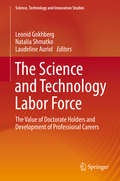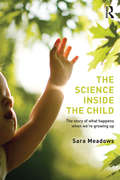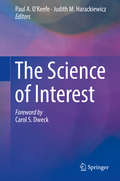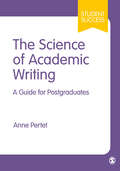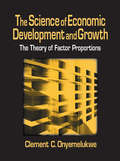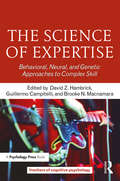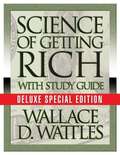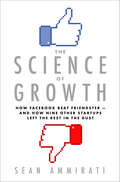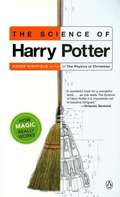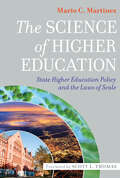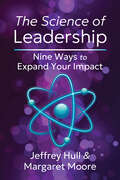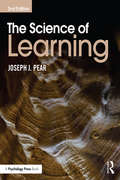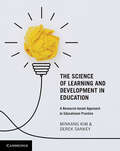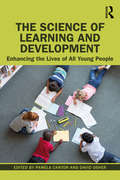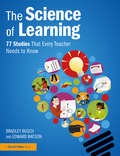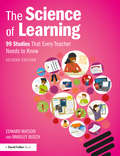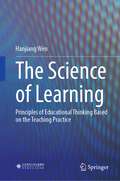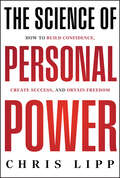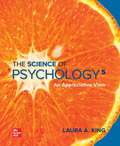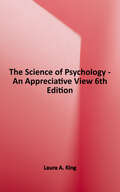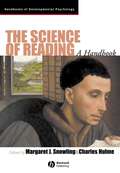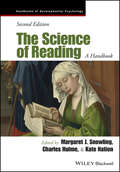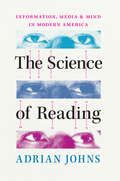- Table View
- List View
The Science and Technology Labor Force
by Leonid Gokhberg Natalia Shmatko Laudeline AuriolThis book provides an in-depth analysis of the demand for PhDs on the labor markets of twelve countries. The authors analyze the role of PhDs in the creation of innovation in a knowledge-based economy and examine economic issues such as the return on investment for the education and training of doctoral graduates. To provide a more comprehensive picture of the employment patterns, career paths and mobility of PhDs in selected countries, the book analyzes various data sources such as labor force surveys and censuses. The authors also develop survey approaches and output tables to collect data on the transition from school to work among PhDs. The book will be of interest to policymakers, companies and researchers responsible for research and innovation systems, as well as to doctoral students looking for a professional career outside the academic world.
The Science inside the Child: The story of what happens when we're growing up
by Sara MeadowsThis engaging book presents some of the ways in which science can describe and explain how and why children develop in the way they do. It looks at children’s individual development within the development of our species, at genes, at the hormone systems that flood our bodies, at the neuroscience of children’s brains, and at patterns of behaviour. It looks, in other words, at the different influences on child development according to the scientific disciplines of evolutionary theory, genetics, epigenetics, endocrinology, neuroscience, epidemiology and psychology. Filled with entertaining anecdotes, Sara Meadows shares the story of what happens when we’re growing up, revealing how science can add depth to our understanding. This book will be an informative and enriching read for all parents, educators and carers, and those interested in how children develop to be emotionally balanced, socially skilled, and enthusiastic seekers after knowledge.
The Science of Interest
by Paul A. O'Keefe Judith M. HarackiewiczThis exceptional volume analyzes the intricate roles interest plays in cognition, motivation and learning, and daily living, with a special focus on its development and maintenance across life domains. Leading experts discuss a spectrum of interest ranging from curiosity to obsession, and trace its functions in goal-setting, decision-making, self-regulation, and performance. New research refines the current knowledge on student interest in educational settings and the social contexts of interest, with insights into why interest levels change during engagement and in the long run. From these findings, contributors address ways to foster and nurture interest in the therapy room and the classroom, for optimum benefits throughout life. Among the topics covered: #65533; Embedding interest within self-regulation. #65533; Knowledge acquisition at the intersection of situational and individual interest. #65533; The role of interest in motivation and engagement. #65533; The two faces of passion. #65533; Creative geniuses, polymaths, child prodigies, and autistic savants. #65533; The promotion and development of interest. A robust guide to a fascinating area of study, The Science of Interest synthesizes the field's current knowledge of interest and indicates future directions. Its chapters contribute depth and rigor to this growing area of research, and will enhance the work of researchers in education, psychologists, social scientists, and public policymakers.
The Science of Academic Writing: A Guide for Postgraduates (Student Success)
by Anne PertetAre you unsure what your thesis should look like? Perhaps you are struggling to get started or tie everything together in your conclusion? Help is here! Taking you from the introduction all the way through to the conclusion, this practical guide will provide you with step-by-step guidance, examples, checklists and expert tips to help you write your thesis with confidence. Student Success is a series of essential guides for students of all levels. From how to think critically and write great essays to boosting your employability and managing your wellbeing, the Student Success series helps you study smarter and get the best from your time at university. .
The Science of Academic Writing: A Guide for Postgraduates (Student Success)
by Anne PertetAre you unsure what your thesis should look like? Perhaps you are struggling to get started or tie everything together in your conclusion? Help is here! Taking you from the introduction all the way through to the conclusion, this practical guide will provide you with step-by-step guidance, examples, checklists and expert tips to help you write your thesis with confidence. Student Success is a series of essential guides for students of all levels. From how to think critically and write great essays to boosting your employability and managing your wellbeing, the Student Success series helps you study smarter and get the best from your time at university. .
The Science of Economic Development and Growth: The Theory of Factor Proportions
by C.C. OnyemelukweA theoretical framework aiming to facilitate study of development economics. The author presents his theory in three sections: how advanced nations developed; a proposed third dimension, in addition to labour and capital; and why capital accumulation is unnecessary, even potentially harmful.
The Science of Expertise: Behavioral, Neural, and Genetic Approaches to Complex Skill (Frontiers of Cognitive Psychology)
by David Z. Hambrick Guillermo Campitelli Brooke N. MacnamaraOffering the broadest review of psychological perspectives on human expertise to date, this volume covers behavioral, computational, neural, and genetic approaches to understanding complex skill. The chapters show how performance in music, the arts, sports, games, medicine, and other domains reflects basic traits such as personality and intelligence, as well as knowledge and skills acquired through training. In doing so, this book moves the field of expertise beyond the duality of "nature vs. nurture" toward an integrative understanding of complex skill. This book is an invaluable resource for researchers and students interested in expertise, and for professionals seeking current reviews of psychological research on expertise.
The Science of Getting Rich: With Study Guide
by Wallace D WattlesThis revolutionary primer on prosperity consciousness has been enriching millions since it was first published in 1910. It was, in fact, the inspiration for The Secret.The way to prosperity is no longer a mystery. You too can prosper from the "exact science" of achieving financial success as you learn to: Change your life by changing your thoughtsAttract the prosperity you deserveAppreciate the opportunities that await youLive true to the values most precious to youManage stress and self-defeating impulses that hold you backMake the contribution to the world that only you can make, and enjoy the abundance you'll receive in returnThis deluxe edition of the classic work, The Science of Getting Rich, includes a 21st century study guide structured with introspective questions that will allow you to explore your inner world, and applythe wisdom the author imparts to your life. It will be a remarkable journey of rejuvenation and self-discovery.
The Science of Growth: How Facebook Beat Friendster—and How Nine Other Startups Left the Rest in the Dust
by Sean AmmiratiIn The Science of Growth, venture capitalist and Carnegie Mellon professor Sean Ammirati tackles the dos and don'ts of successful scaling, by looking at the startups that have won—and lost.The lean entrepreneurship movement has captivated Silicon Valley and entrepreneurs across the country. It's provided an agile framework to develop the right product solution for a given target market, and is now used by almost every fledgling company to do just that.The next challenge is growth - to achieve the financial returns and, more importantly, the impact they dreamed of when starting off on their adventure. Why do some companies realize the VC's goal of a 10x return on investment, while others flounder? What differentiates the companies that become part of the fabric of our lives and remain responsive, no matter how big they get from those that quickly fade? To find out, Ammirati looks at 20 different companies in pairs, who have achieved product-market fit at about the same point in history with the same general target customer-one of which has gone on to achieve real scale, while the other languished.As his research reveals, just a handful of choices-among them, who to partner with, how to finance growth, and how to use data-make all the difference in the world. With such intriguing examples as LinkedIn vs. Spoke, Facebook vs. Friendster, and McDonald's vs. White Castle, Ammirati shows the secret of "the science of growth" and how to cultivate it in any organization.
The Science of Harry Potter
by Roger HighfieldCan Fluffy the three-headed dog be explained by advances in molecular biology? Could the discovery of cosmic "gravity-shielding effects" unlock the secret to the Nimbus 2000 broomstick's ability to fly? Is the griffin really none other than the dinosaur Protoceratops? Roger Highfield, author of the critically acclaimed The Physics of Christmas, explores the fascinating links between magic and science to reveal that much of what strikes us as supremely strange in the Potter books can actually be explained by the conjurings of the scientific mind. This is the perfect guide for parents who want to teach their children science through their favorite adventures as well as for the millions of adult fans of the series intrigued by its marvels and mysteries.
The Science of Higher Education: State Higher Education Policy and the Laws of Scale
by Mario C. MartinezPerennial conclusions from state-by-state funding-per-student analyses of underfunding and weak state commitment have become so common that they have diluted the potency of the argument to state policymakers for more higher education funding. In addition, there has been little in the way of testing or questioning the assumptions embedded in traditional funding per student analysis and its accompanying conclusions.As state legislators balance the competing needs of education, health, transportation, and public safety budgets, they increasingly ask what return on investment (ROI) they get for the funding they provide, including from higher education. The ROI language, while potentially unsettling for its corporate-like and neoliberal connotation, will persist into the foreseeable future. We must ask questions both of adequacy (How much funding should the states provide?) and benefit (What benefits do states receive for the higher education funding they provide?). The focus on traditional funding per student analysis has remained static for over forty years, indicating the need for new ideas and methods to probe questions of adequacy and benefit.The Science of Higher Education is an introduction to a new paradigm that explores state higher education funding, enrollment, completion, and supply (the number and type of institutions in a state) through the lens of what are commonly known as power laws. Power laws explain patterns in biological systems and characteristics of cities. Like cities, state higher education systems are complex adaptive systems, so it is little surprise that power laws also explain funding, enrollment, completion, and supply.The scale relationships uncovered in the Science of Higher Education suggest the potential benefits state policymakers could derive by emphasizing enrollment, completion, or capacity policies, based on economies of scale, marginal benefits, and the return state’s get on enrollment and completion for the funding they provide.The various features of state higher education systems that conform to scale patterns do not alone provide definitive answers for appropriate funding levels, however. As this book addresses, policymakers need to take into account the macro forces, from demography to geography and the economy, that situate the system, as well the interactions between government and market actors that are at the core of every state higher education system and influence the outcomes it achieves.
The Science of Leadership: Nine Ways to Expand Your Impact
by Margaret Moore Jeffrey HullAt last, everyday leaders can put the science of leadership into action every day to model, inspire, and empower others to perform at their best.The Science of Leadership: Nine Ways to Expand Your Impact presents a game-changing synthesis of 50 years of leadership research as a comprehensive guide for seasoned and aspiring leaders, and anyone who wants to help their boss become a better leader.Authors Jeffrey Hull and Margaret Moore, leadership coaches and leaders of the Institute of Coaching, translate academic research and their extensive experience in leading and coaching into a practical, self-coaching roadmap for your own growth in these times of exponential change and disruption.This book organizes the science of leadership (15,000+ studies and articles showing what improves individual, team, and organizational performance) into nine capacities which build upon each other. Each capacity is brought to life by real-life stories, a science overview, practices, and ways to deal with overuse. These capacities are organized into three levels with increasing complexity:Self-Oriented1. Conscious - See clearly, including myself2. Authentic - Care3. Agile - FlexOther-Oriented4. Relational - Help5. Positive - Strengthen6. Compassionate - ResonateSystem-Oriented (team and organization)7. Shared - Share8. Servant - Serve9. Transformational - TransformWhether you're a C-suite executive, an emerging leader, or a professional coach or consultant, The Science of Leadership delivers the fundamentals you need to know. You will quiet your ego and feel more fulfilled as a leader as your impact grows. Leading will feel more like flying than trudging uphill, with more ease, less strain, and more pleasure.
The Science of Learning
by Joseph J. PearFor over a century and a quarter, the science of learning has expanded at an increasing rate and has achieved the status of a mature science. It has developed powerful methodologies and applications. The rise of this science has been so swift that other learning texts often overlook the fact that, like other mature sciences, the science of learning has developed a large body of knowledge. The Science of Learning comprehensively covers this knowledge in a readable and highly systematic manner. Methodology and application are discussed when relevant; however, these aspects are better appreciated after the reader has a firm grasp of the scientific knowledge of learning processes. Accordingly, the book begins with the most fundamental and well-established principles of the science and builds on the preceding material toward greater complexity. The connections of the material with other sciences, especially its sister science, biology, are referenced throughout. Through these frequent references to biology and evolution, the book keeps in the forefront the recognition that the principles of learning apply to all animals. Thus, in the final section the book brings together all learning principles studied in research settings by demonstrating their relevance to both animals and humans in their natural settings. For animals this is the untamed environment of their niches; for humans it is any social environment, for Homo sapiens is the social and learning animal par excellence.
The Science of Learning and Development in Education: A Research-based Approach to Educational Practice
by Minkang Kim Derek SankeyAll teachers need to know how children and adolescents learn and develop. Traditionally, this knowledge had been informed by a mix of speculative and scientific theory. However, in the past three decades there has been substantial growth in new scientific knowledge about how we learn. The Science of Learning and Development in Education provides an exciting and comprehensive introduction to this field. This innovative text introduces readers to brain science and the science of complex systems as it applies to human development. Section 1 examines the science of learning and development in the 21st century; Section 2 explores the emotional, cultural, moral and empathetic brain; and Section 3 focuses on learning, wellbeing and the ecology of learning environments. Written in an engaging style by leading experts and generously illustrated with colour photographs and diagrams, The Science of Learning and Development in Education is an essential resource for pre-service teachers.
The Science of Learning and Development: Enhancing the Lives of All Young People
by Pamela Cantor; David OsherThis essential text unpacks major transformations in the study of learning and human development and provides evidence for how science can inform innovation in the design of settings, policies, practice, and research to enhance the life path, opportunity and prosperity of every child. The ideas presented provide researchers and educators with a rationale for focusing on the specific pathways and developmental patterns that may lead a specific child, with a specific family, school, and community, to prosper in school and in life. Expanding key published articles and expert commentary, the book explores a profound evolution in thinking that integrates findings from psychology with biology through sociology, education, law, and history with an emphasis on institutionalized inequities and disparate outcomes and how to address them. It points toward possible solutions through an understanding of and addressing the dynamic relations between a child and the contexts within which he or she lives, offering all researchers of human development and education a new way to understand and promote healthy development and learning for diverse, specific youth regardless of race, socioeconomic status, or history of adversity, challenge, or trauma. The book brings together scholars and practitioners from the biological/medical sciences, the social and behavioral sciences, educational science, and fields of law and social and educational policy. It provides an invaluable and unique resource for understanding the bases and status of the new science, and presents a roadmap for progress that will frame progress for at least the next decade and perhaps beyond.
The Science of Learning: 77 Studies That Every Teacher Needs to Know
by Edward Watson Bradley BuschSupporting teachers in the quest to help students learn as effectively and efficiently as possible, The Science of Learning translates 77 of the most important and influential studies on the topic of learning into accessible and easily digestible overviews. Demystifying key concepts and translating research into practical advice for the classroom, this unique resource will increase teachers’ understanding of crucial psychological research so they can help students improve how they think, feel and behave in school. From large to- small-scale studies, from the quirky to the iconic, The Science of Learning breaks down complicated research to provide teachers with the need-to-know facts and implications of each study. Each overview combines graphics and text, asks key questions, describes related research and considers implications for practice. Highly accessible, each overview is attributed to one of seven key categories: Memory: increasing how much students remember Mindset, motivation and resilience: improving persistence, effort and attitude Self-regulation and metacognition: helping students to think clearly and consistently Student behaviours: encouraging positive student habits and processes Teacher attitudes, expectations and behaviours: adopting positive classroom practices Parents: how parents’ choices and behaviours impact their childrens’ learning Thinking biases: avoiding faulty thinking habits that get in the way of learning A hugely accessible resource, this unique book will support, inspire and inform teaching staff, parents and students, and those involved in leadership and CPD.
The Science of Learning: 99 Studies That Every Teacher Needs to Know
by Edward Watson Bradley BuschSupporting teachers in the quest to help students learn as effectively and efficiently as possible, The Science of Learning translates 99 of the most important and influential studies on the topic of learning into accessible and easily digestible overviews. Building on the bestselling original book, this second edition delves deeper into the world of research into what helps students learn, with 22 new studies covering key issues including cognitive-load theory, well-being and performing well under exam pressure. Demystifying key concepts and translating research into practical advice for the classroom, this unique resource will increase teachers’ understanding of crucial psychological research so they can help students improve how they think, feel and behave in school. From large- to small-scale studies, from the quirky to the iconic, the book breaks down complicated research to provide teachers with the need-to-know facts and implications of each study. Each overview combines graphics and text, asks key questions, describes related research and considers implications for practice. Highly accessible, each overview is attributed to one of seven key categories: Memory: increasing how much students remember Mindset, motivation and resilience: improving persistence, effort and attitude Self-regulation and metacognition: helping students to think clearly and consistently Student behaviours: encouraging positive student habits and processes Teacher attitudes, expectations and behaviours: adopting positive classroom practices Parents: how parents’ choices and behaviours impact their childrens’ learning Thinking biases: avoiding faulty thinking habits that get in the way of learning A hugely accessible resource, this unique book will support, inspire and inform teaching staff, parents and students, and those involved in leadership and CPD.
The Science of Learning: Principles of Educational Thinking Based on the Teaching Practice
by Hanjiang WenThis book systematically summarizes the author's more than 30 years of experience in teaching reform and educational research. The book is divided into three parts. Part I focuses on the comprehensiveness of thinking and the relationship between the coordinated development of thinking and the overall development of human beings. Part II and Part III mainly discuss the six basic principles of learning and thinking: the principle of the working memory of thinking, the principle of learning transfer, the principle of the basic process of learning, the principle of multi-level development of ability, the principle of sustainable development of learning, and the principle of subjectivity of learning.This book features the rules and characteristics of student learning with a student-centered approach, which can help teachers and educational researchers to better understand students and provide theoretical guidance for students’ all-round development.
The Science of Personal Power: How to Build Confidence, Create Success, and Obtain Freedom
by Chris LippUnlock the door to personal power, happiness, achievement, and strength in any situation In The Science of Personal Power, renowned professor and persuasion expert Chris Lipp reveals how to bridge the science of inner well-being with the science of outer achievement by developing personal power—a concept that, when put into practice, is a panacea for both happiness and success. Unlike formal power, which focuses on authority and control, personal power is about how we feel about our own capability to create impact. When we feel big, we show up big, and when we show up big, we can change the world. This book offers a transformative approach to completely revamp every aspect of your life, starting with your present mindset and extending to long-term career advancement, financial success, and beyond. Enhanced Self-Confidence: Learn how to feel more capable and impactful in your daily life. Practical Tools for Success: Gain actionable strategies and tips to improve your personal and professional life. Increased Influence: Discover how to effectively influence others and drive positive change. The Science of Personal Power combines research, data, and storytelling to help you understand foundational concepts related to psychology and business. It highlights counter-intuitive discoveries and reconciles conflicting findings to provide practical tips, strategies, and approaches to enhance personal power and influence others. This book is designed for anyone looking to rise above personal obstacles and societal barriers to become the most powerful version of themselves. Ready to transform your life from the inside out? Tap into your personal power and start your journey towards happiness and success with The Science of Personal Power today.
The Science of Psychology (Third Edition)
by Laura A. KingFocusing on why things go right, The Science of Psychology: An Appreciative View, Third Edition, helps students understand and appreciate psychology as a science and as an integrated whole. The third edition's program extends the themes and enhances the pedagogical value by guiding students toward topics they find the most challenging and then offering new learning resources to help students master them.
The Science of Psychology: An Appreciative View
by Laura A. KingThis book communicates the nature and breadth of psychology -and its value as a science - with an emphasis on why things go right. With primary goals of teaching students to think like psychological scientists and focusing on the understanding of human strengths and capacities, health, and wellness, the book cultivates students’ appreciation for how extensively psychology applies to their lives.
The Science of Psychology: An Appreciative View, 6th Edition
by Laura A. KingFocusing on why things go right, The Science of Psychology: An Appreciative View helps students understand and appreciate psychology as a science and as an integrated whole. Informed by student data, the program extends these themes and enhances their pedagogical value by helping students through topics they find the most challenging and offering learning resources to master them. With a deep integration of cultural diversity, the text offers a “Guide to Diversity, Equity, and Inclusion” in the Preface, providing a chapter-by-chapter list of topics involving DEI issues and research. When paired with Connect, students will also benefit from Thematic Relevancy Modules (brief, thought-provoking modules tied to the APA's IPI Student Learning Outcomes), Interactivities and Application-Based-Activities, Psych-at-Work videos (interviews with real people), the new and unique Immersive Brain, and more innovative resources to help further prepare them to be successful in this course.
The Science of Reading
by Charles Hulme Margaret J. SnowlingThe Science of Reading: A Handbook brings together state-of-the-art reviews of reading research from leading names in the field, to create a highly authoritative, multidisciplinary overview of contemporary knowledge about reading and related skills.Provides comprehensive coverage of the subject, including theoretical approaches, reading processes, stage models of reading, cross-linguistic studies of reading, reading difficulties, the biology of reading, and reading instruction Divided into seven sections:Word Recognition Processes in Reading; Learning to Read and Spell; Reading Comprehension; Reading in Different Languages; Disorders of Reading and Spelling; Biological Bases of Reading; Teaching Reading Edited by well-respected senior figures in the field
The Science of Reading: A Handbook (Wiley Blackwell Handbooks of Developmental Psychology #9)
by Charles Hulme Margaret J. Snowling Kate NationProvides an overview of state-of-the-art research on the science of reading, revised and updated throughout The Science of Reading presents the most recent advances in the study of reading and related skills. Bringing together contributions from a multidisciplinary team of experts, this comprehensive volume reviews theoretical approaches, stage models of reading, cross-linguistic studies of reading, reading instruction, the neurobiology of reading, and more. Divided into six parts, the book explores word recognition processes in skilled reading, learning to read and spell, reading comprehension and its development, reading and writing in different languages, developmental and acquired reading disorders, and the social, biological, and environmental factors of literacy. The second edition of The Science of Reading is extensively revised to reflect contemporary theoretical insights and methodological advances. Two entirely new chapters on co-occurrence and complexity are accompanied by reviews of recent findings and discussion of future trends and research directions. Updated chapters cover the development of reading and language in preschools, the social correlates of reading, experimental research on sentence processing, learning to read in alphabetic orthographies, comorbidities that occur frequently with dyslexia, and other central topics. Demonstrates how different knowledge sources underpin reading processes using a wide range of methodologies Presents critical appraisals of theoretical and computational models of word recognition and evidence-based research on reading intervention Reviews evidence on skilled visual word recognition, the role of phonology, methods for identifying dyslexia, and the molecular genetics of reading and language Highlights the importance of language as a foundation for literacy and as a risk factor for developmental dyslexia and other reading disorders Discusses learning to read in different types of writing systems, with a language impairment, and in variations of the home literacy environment Describes the role of contemporary analytical tools such as dominance analysis and quantile regression in modelling the development of reading and comprehensionPart of the acclaimed Wiley Blackwell Handbooks of Developmental Psychology series, the second edition of The Science of Reading: A Handbook remains an invaluable resource for advanced students, researchers, and specialist educators looking for an up-to-date overview of the field.
The Science of Reading: Information, Media, and Mind in Modern America
by Adrian JohnsFor the first time, the story of how and why we have plumbed the mysteries of reading, and why it matters today. Reading is perhaps the essential practice of modern civilization. For centuries, it has been seen as key to both personal fulfillment and social progress, and millions today depend on it to participate fully in our society. Yet, at its heart, reading is a surprisingly elusive practice. This book tells for the first time the story of how American scientists and others have sought to understand reading, and, by understanding it, to improve how people do it. Starting around 1900, researchers—convinced of the urgent need to comprehend a practice central to industrial democracy—began to devise instruments and experiments to investigate what happened to people when they read. They traced how a good reader’s eyes moved across a page of printed characters, and they asked how their mind apprehended meanings as they did so. In schools across the country, millions of Americans learned to read through the application of this science of reading. At the same time, workers fanned out across the land to extend the science of reading into the social realm, mapping the very geography of information for the first time. Their pioneering efforts revealed that the nation’s most pressing problems were rooted in drastic informational inequities, between North and South, city and country, and white and Black—and they suggested ways to tackle those problems. Today, much of how we experience our information society reflects the influence of these enterprises. This book explains both how the science of reading shaped our age and why, with so-called reading wars still plaguing schools across the nation, it remains bitterly contested.
